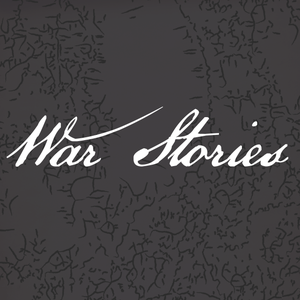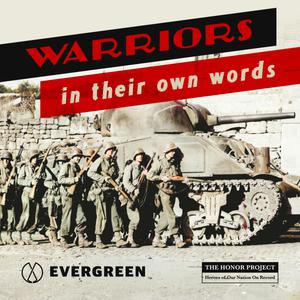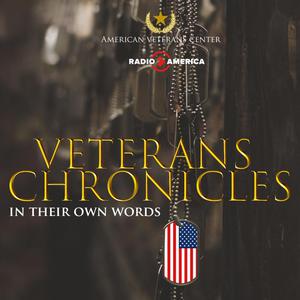
War Stories
War Stories
- 1 hour 7 minutesA Most Unlikely Race
Hey listeners, did you know we're not just trying and failing to come up with new podcast ideas every week? Staffer and Adin have been away working on books. Adin's is out next week; Staffer interviewed him about it.
Sprinting Through No Man's Land tells the story of the first Tour de France race after World War I, arguably its most grueling iteration. In telling this story, Adin also looks at that first moment after a war ends, when people are trying to figure out what their new world will look like.
Sprinting is available at Amazon, Bookshop, or wherever local you buy your books.
www.warstoriescast.com
23 June 2021, 10:00 pm - 22 minutes 40 secondsThe 82nd's Almost Mission to Rome
There were a lot of crazy ideas in World War II. But possibly none more than dropping the 82nd Airborne Division on Rome in order to seize it after Italy capitulated. In this episode, Angry Staff Officer follows two US officers on their secret mission to Rome to negotiate with Italian leadership, and the result this would have for the airborne operation.
www.warstoriescast.com
12 November 2020, 5:16 pm - 58 minutes 39 secondsBats! The Musical
Nearly every one of our episodes focused on humans' interactions with a particular type of inanimate object on the battlefield, sometimes the way in which the object is wielded by others, sometimes the actions those humans have to take in order to survive the ordeal. It's not just inanimate objects, though, that have found their way into militaries, but animals besides humans that have been used for most everything from hauling weapons to carrying troops to serving as weapons themselves.
In this episode, Staffer and Adin are joined by Hannah Palsa, a PhD student at Kansas State University studying WWII's Dogs for Defense program.
21 May 2020, 6:30 pm - 59 minutes 28 secondsA Very Special Lexington and Concord Reading
Hello! We've missed you during our extended hiatus.
As both Staffer and Adin have been holed up in their respective bunkers and finishing up their book projects, they found some extra time to talk to one another. After hearing from listeners on Twitter, one topic was requested more than all the others...
12 April 2020, 11:30 am - 34 minutes 44 secondsLoose Rounds #9 - AUSA Live Show
To wrap up the season of Loose Rounds, Adin and Angry Staff Officer ventured to Washington, DC and the Association of the United States Army's annual conference. There, they held a live show, brought together by Nammo, which covers everything from what a trade show might've looked like before the Battle of Crecy to how the podcast came into being.
www.warstoriescast.com/loose-rounds
3 December 2018, 3:30 am - 33 minutes 26 secondsLoose Rounds #8 - Wheels
What's the simplest item that's changed the shape of warfare? The bullet? The boot? How about the humble wheel? In this episode of Loose Rounds, Adin and Angry Staff Officer trace the development of the wheel throughout history, and how it's shaped how wars are fought on and off the battlefield.
17 September 2018, 2:30 am - 40 minutes 37 secondsLoose Rounds #7 - Ship Design
For nearly as long as people have been fighting, they've had ships to take them to the fight, or to use as weapons of war themselves. From the coracle to the trireme to the battleship, has there been an overall arc toward the perfect naval vessel?
www.warstoriescast.com/looserounds
21 August 2018, 4:00 pm - 32 minutes 21 secondsLoose Rounds #6 - Cartography
Before compasses, sextants, and the telescope, there was the map. They were simple things to begin with. Then they became essential, allowing explorers and conquerors to leave their home lands for far off destinations. Then they became something even more.
16 July 2018, 2:30 am - 34 minutes 36 secondsLoose Rounds #5 - Field Rations
Members of the military oftentimes talk about how little they need to get by. Without the creature comforts the everyday person may come to expect. But there's one thing they've needed from the first days we fought wars. Food. In this episode of Loose Rounds, Angry Staff Officer and Adin take a look at the history of eating in the field and whether there's a higher purpose to field rations than jamming it full of calories, protein, and vitamins.
www.warstoriescast.com
18 June 2018, 2:30 am - 35 minutes 35 secondsLoose Rounds #4 - Communications
Until someone invents a solution to time travel, distance on the battlefield will define how wars are fought. Communications have attempted to solve for this problem since wars first began: first with runners, up to the present day with radio communications. But how much have things really changed over those thousands of years? Angry Staff Officer and Adin take a look.
www.warstoriescast.com
18 May 2018, 2:30 am - 39 minutes 58 secondsLoose Rounds #3 - Logistics
Amateurs talk tactics, professionals talk logistics. Right? In the third episode of the series, Adin and Staffer discuss the incorporation of logistics into professional militaries and how, in some ways, logistics helped bring about an international trading system.
16 April 2018, 2:30 am - More Episodes? Get the App
Your feedback is valuable to us. Should you encounter any bugs, glitches, lack of functionality or other problems, please email us on [email protected] or join Moon.FM Telegram Group where you can talk directly to the dev team who are happy to answer any queries.
 The Dead Prussian Podcast
The Dead Prussian Podcast
 Modern War Institute
Modern War Institute
 USAHEC Military History Lectures (Audio)
USAHEC Military History Lectures (Audio)
 The Spear
The Spear
 Warriors In Their Own Words | First Person War Stories
Warriors In Their Own Words | First Person War Stories
 Veterans Chronicles
Veterans Chronicles